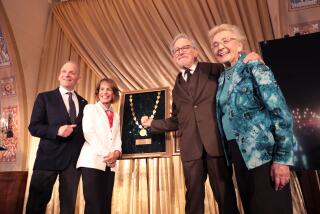Center Will Study Genocide
- Share via
A center dedicated to the study of the Holocaust and other atrocities was announced Thursday at Claremont McKenna College.
The Center for the Study of the Holocaust, Genocide and Human Rights will examine “not just World War II and what happened to Jews and Gypsies and other victims,” said Jonathan Petropoulos, history professor and director of the Gould Center for Humanistic Studies. “It’s comparative. It’s looking at ... Rwanda, Cambodia. We hope the scholarship will help prevent such tragedies in the future.”
Although the center has been officially established, the college will seek $6 million in grants and donations to host conferences, create an endowed chair, bring in specialists and publish scholarly texts. The center will be based at Claremont McKenna, but use resources from all the Claremont Colleges.
“This would be a chance to institutionalize the work already done by many [individual] faculty members,” said John Roth, a philosophy professor and Holocaust historian.
The center was announced at “The Future of Holocaust Education, Holocaust Studies and Post-Holocaust Justice,” a symposium that included some of the top scholars and officials in the field.
One of those was Stuart Eizenstat, the Clinton administration’s special envoy on Holocaust reparations issues who negotiated compensation agreements with Switzerland, France, Germany and Austria.
Of the center, he said: “There are many Holocaust courses today in contrast to the 1950s, ‘60s, ‘70s, but there are precious few academic centers looking at the Holocaust as a whole across academic lines.”
Studying the Holocaust through the lenses of history, sociology, political science, psychology and other disciplines can help teach about the possibilities of humanity’s future, Eizenstat said.
“The Holocaust is one of those rare issues that looms larger and seems more relevant the further away you are from it,” he said. “It represents a sort of evil incarnate that leads one to study a variety of things. What could lead a country like Germany ... to have done such a thing? And what does that say about societies in the future?”
Sara Bloomfield, executive director of the United States Holocaust Memorial Museum, said world events show that the issues at the root of the Holocaust still need to be addressed.
“One of the important lessons of the Holocaust is we seem not to have learned the lessons of Holocaust,” she said.
More to Read
Sign up for Essential California
The most important California stories and recommendations in your inbox every morning.
You may occasionally receive promotional content from the Los Angeles Times.













